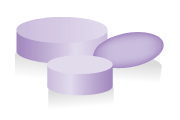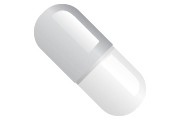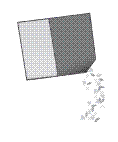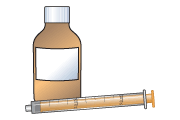Ibuprofen for pain and inflammation
This leaflet is for parents and carers about how to use this medicine in children. Our information may differ from that provided by the manufacturers, because their information usually relates to adults. Read this leaflet carefully. Keep it somewhere safe so that you can read it again.
If your child is allergic to other drugs for inflammation or has asthma, check with your doctor before giving this medicine.
Name of medicine
Ibuprofen
Common brands: Calprofen, Feverfen, Nurofen for Children, Orbifen for Children, Brufen, Arthrofen, Ebufac, Rimafen. Modified release: Brufen Retard, Fenbid
Why is it important for my child to take Ibuprofen?
It is important to give ibuprofen, as advised by your doctor, to help control your child’s pain. It will work best for inflammation and long-term pain when your child takes it regularly for a few days . This leaflet is about ibuprofen prescribed by your doctor. If you have bought ibuprofen to treat your child’s pain, it is important to follow the instructions for your child’s age that are given with the packet you bought.
What is Ibuprofen available as?
- Tablets: 200 mg, 400 mg, 600 mg; modified-release: 800 mg
- Modified-release capsules: 300 mg
- Granules: 600 mg per sachet; these may not be suitable for children on a low-sodium diet
- Liquid medicine: 100 mg in 5 mL; this may contain sugar, but you can ask for a sugar-free medicine
When should I give Ibuprofen
Ibuprofen is usually given three or four times a day. Your doctor will tell you how often to give it.
- Three times each day: this should be once in the morning, once in the early afternoon and once in the evening. Ideally, these times are at least 6 hours apart, for example 8 am, 2 pm and 8 pm.
- Four times a day: this is usually first thing in the morning, at about midday, late in the afternoon and at bedtime. Ideally, these times are at least 4 hours apart, for example 8 am, midday, 4 pm and 8 pm.
Modified-release tablets or capsules
If your child has pain all the time, your doctor may prescribe modified-release tablets or capsules. These are given once or twice each day. Your doctor will tell you how often to give the medicine.
- Once a day: this is usually in the evening.
- Twice a day: this should be once in the morning and once in the evening. Ideally these times are 10–12 hours apart, for example some time between 7 and 8 am and between 7 and 8 pm.
Give the medicine at about the same time(s) each day so that this becomes part of your child’s daily routine, which will help you to remember.
Do not give modified-release tablets or capsules every 6 hours.
How much should I give?
Your doctor will work out the amount of Ibuprofen (the dose) that is right for your child. The dose will be shown on the medicine label.
It is important that you follow your doctor’s instructions about how much to give.
How should I give Ibuprofen?

Tablets
- Tablets should be swallowed with a glass of water, squash or juice. Your child should not chew the tablet.

Capsules
- Capsules should be swallowed with a glass of water, squash or juice. Your child should not chew the capsule.

Granules
- Sprinkle or stir the granules into a small amount of soft food (e.g. yogurt) or a small drink, or you can mix them with a spoonful of cold water. Do not mix the granules with warm food or liquid. Your child should then swallow the food or drink it straight away, without chewing. Make sure that they take it all. Do not keep the granule/food mixture to give later.

Liquid medicine
- Shake the medicine well.
- Measure out the right amount using an oral syringe or a medicine spoon. You can get these from your pharmacist. Do not use a kitchen teaspoon as it will not give the right amount.
When should the medicine start working?
Your child should start to feel less pain 20–30 minutes after taking Ibuprofen but it will have more effect against pain and inflammation when your child has been taking it regularly for a few days.
For some types of long-term inflammation and pain, your child will need to take Ibuprofen regularly for a few weeks for it to work properly.
What if my child is sick (vomits)?
- If your child is sick less than 30 minutes after having a dose of ibuprofen, give them the same dose again.
- If your child is sick more than 30 minutes after having a dose of ibuprofen, do not give them another dose. Wait at least 6 hours before giving another dose of ibuprofen.
What if I forget to give it?
If your child is in pain, give the missed dose as soon as you remember. You must then wait at least 6 hours before giving the next dose.
Never give a double dose of Ibuprofen.
What if I give too much?
If you think you may have given your child an extra dose of Ibuprofen by mistake, wait at least 12 hours before giving another dose.
If you are concerned that you may have given more than one extra dose, contact your doctor or local NHS services (details at end of leaflet) or take your child to hospital straight away. Take the medicine container or packaging with you, even if it is empty. This will be useful to the doctor. Have the packaging with you if you telephone for advice.
If your child has heart, kidney or liver disease, you must be especially careful not to give too much Ibuprofen.
Are there any possible side effects?
We use medicines to make our children better, but sometimes they have other effects that we don’t want (side effects).
Side effects you must do something about
If your child is short of breath or is wheezing, or their face, lips or tongue start to swell, or they develop a rash, they may be allergic to Ibuprofen. Take your child to hospital or phone for an ambulance straight away.
If your child gets bad stomach pain, brings up (vomits) blood or their stools (poo) are very dark, contact your doctor or take your child to hospital straight away, as they may have an ulcer.
Ibuprofen may make asthma worse in some children, but this is uncommon. Contact your doctor if you are worried.
Other side-effects you need to know about
- Ibuprofen may cause stomach pain, indigestion or heartburn, and your child may feel sick (nausea) or be sick (vomit). You can help to reduce this by giving ibuprofen with food. If these symptoms carry on, or get worse, they may be signs of irritation to the stomach or oesophagus (food pipe). Contact your doctor if this happens.
- Your child may get diarrhoea (runny poo).
- Your child may hear ringing in their ears, although this usually only happens if your child is taking a high dose of ibuprofen.
Your child may get diarrhoea.
If your child stops passing urine (doing a wee) or there is blood in their urine (wee), contact your doctor straight away as there may be a problem with their kidneys.
Can other medicines be given at the same time as Ibuprofen?
- Medicines that you can buy from the supermarket or pharmacy may contain Ibuprofen (this information is given on the label). Do not give such medicines to your child if you have given them Ibuprofen, as you risk giving them too much.
- Ibuprofen should not be taken with some medicines. Tell your doctor or pharmacist about any other medicines your child is taking before giving Ibuprofen.
- You can give your child medicines that contain paracetamol, unless your doctor has told you not to.
Check with your doctor or pharmacist before giving any other medicines to your child. This includes herbal and complementary medicines.
Is there anything else I need to know about this medicine?
Ibuprofen is one of a group of drugs called non-steroidal anti-inflammatory drugs (NSAIDs). If your child has previously reacted to other drugs of this type, you should tell your doctor before starting Ibuprofen.
- Sometimes, ibuprofen can cause bleeding or a stomach ulcer when it is taken regularly for a long time. Give ibuprofen to your child with some food to help stop this.
- Ibuprofen is not recommended for use in children with chicken pox or shingles as, very occasionally, serious side effects have occurred. If your child is taking Ibuprofen regularly for pain or inflammation and develops chicken pox, contact your doctor for advice about alternative treatment.
General advice about medicines
- Try to give medicines at about the same times each day, to help you remember.
- If you are not sure a medicine is working, contact your doctor but continue to give the medicine as usual in the meantime. Do not give extra doses, as you may do harm.
- Only give this medicine to your child. Never give it to anyone else, even if their condition appears to be the same, as this could do harm.
- If you think someone else may have taken the medicine by accident, contact your doctor or NHS local services (details at end of leaflet) for advice.
- Make sure that you always have enough medicine. Order a new prescription at least 2 weeks before you will run out.
- Make sure that the medicines you have at home have not reached the ‘use by’ date on the packaging. Give old medicines to your pharmacist to dispose of.
Where should I keep this medicine?
- Keep the medicine in a cupboard, away from heat and direct sunlight.
- It does not need to be kept in the fridge.
- Make sure that children cannot see or reach the medicine.
- Keep the medicine in the container it came in.
Who to contact for more information?
Your child’s doctor or pharmacist will be able to give you more information about Ibuprofen and other medicines used to treat pain and inflammation.
England: NHS 111
Tel 111
www.nhs.ukScotland: NHS 24
Tel 111
www.nhs24.scotNorthern Ireland: NI Direct
Wales: NHS 111 Wales
Tel 111
www.111.wales.nhs.ukCopyright disclaimer
Version [2]. © NPPG, RCPCH and WellChild, all rights reserved. Review by November 2015.
The primary source for the information in this leaflet is the British National Formulary for Children. For details on any other sources used for this leaflet, please contact us through our website, www.medicinesforchildren.org.uk.
We take great care to make sure that the information in this leaflet is correct and up-to-date. However, medicines can be used in different ways for different patients. It is important that you ask the advice of your doctor or pharmacist if you are not sure about something. This leaflet is about the use of these medicines in the UK, and may not apply to other countries. The Royal College of Paediatrics and Child Health (RCPCH), the Neonatal and Paediatric Pharmacists Group (NPPG), WellChild and the contributors and editors cannot be held responsible for the accuracy of information, omissions of information, or any actions that may be taken as a consequence of reading this leaflet.
